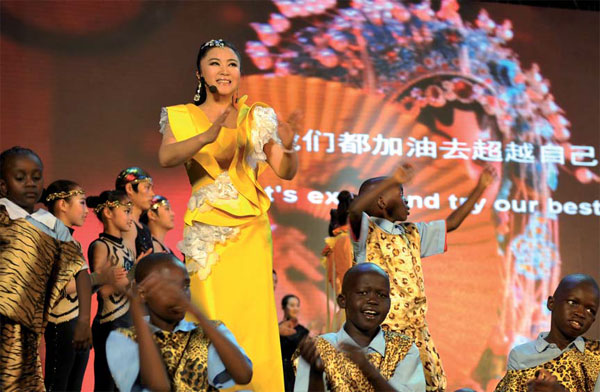Arts and culture cement ties
|
A Chinese singer and Kenyan children perform during the Night of Beijing gala held in Nairobi, Kenya, March 26, 2012. Photo by Xinhua |
Sino-Kenya friendship goes through new phase
The attractive glossy photographs in the hallway leading to the Confucius Institute at the University of Nairobi provide a sneak preview of the strength of cultural ties between Kenya and China.
Faculty members at the institute in Kenya's oldest university agree that China's centuries-old civilization has a strong imprint in the country.
As Kenya refashions its policy to turn eastward, policymakers and scholars say arts and culture will play a critical role in cementing ties between the two countries.
Sino-Kenyan cultural exchange programs were formalized 50 years ago when Kenya gained independence.
"China has awarded thousands of scholarships to Kenyan policymakers, scholars and young students to visit the country and learn about its unique culture and traditions," says an official at the Kenyan Ministry of Arts, Culture and Sports who did not want to be named.
"These scholarships have always been channeled through the ministries of foreign affairs, education and culture."
Kenyan policymakers have benefited from Chinese government scholarships in various fields, including medicine, technology, arts, culture and diplomacy, he says.
"Chinese universities have been the training ground for some of our best technocrats in diverse areas like agriculture, diplomacy, music and literature. A certain generation of Kenyans was exposed to oriental culture way back in the 60s."
The Kenyan government is committed to fostering robust cultural exchanges between Kenyan and Chinese youths as part of a new-look foreign policy, he says.
"We have made significant inroads in our economic cooperation with China, and the time is ripe to cultivate friendship through education, arts and culture."
The overwhelming influence of Western culture on Kenyans has limited their understanding of oriental traditions.
Aghan Odero, an actor, says that because of colonial history cooperation between Kenya and China in arts and culture is still not what it could be.
"An entire generation of Kenyans grew up under the tutelage of Western mentors and role models who imparted their values and traditions on us. Few Kenyans were exposed to the East."
Odero, who has visited China several times on Kenyan government funded cultural exchange programs, says he admires Chinese arts such as folklore and dance.
"Now that we have a Chinese presence in our educational institutions, it is my hope that young Kenyans will study Chinese civilization and the country's journey through history."
Kenyans who have visited China talk of their admiration for its rich culture and traditions.
"During my stint in China, I learnt that the Chinese people cherish their culture," says Joan Omollo, a Mandarin student at the University of Nairobi. "The entire country cerebrates all cultural events and showcases them to foreigners."
Omollo is a member of a Confucius choir and visited China twice last year in a cultural exchange program funded by the Chinese government to expose foreign students to the country's civilization.
"I mingled with local people in Beijing and Tianjin and learnt a lot about the country's history," Omollo says. "Our hosts were very receptive and enlightened us on many aspects of Chinese contemporary arts and culture."
Asked whether she encountered any cultural shock in China, Omollo says that despite the language difficulties, Chinese are friendly to foreigners and are keen to learn more about the world.
She praises the authenticity and attractiveness of Chinese cultural festivals and says she regrets that Kenyans' understanding of Chinese culture and traditions is still limited.
"Many Kenyans are biased toward Western culture due to the influence of the media and the naive belief that anything from America or Europe is superior and chic. Now that we are turning East, it is my hope that Kenyans will learn Chinese language and culture to smooth our relationship with our new friends."
Another student at the Confucius Institute, Kwamboka Ngoko, says cultural exchanges between Kenya and China are experiencing teething problems because of the limited interaction between the two peoples.
"Mandarin was just introduced in our universities recently, and besides that, many Kenyans' understanding of China is limited economic to fields such as infrastructure development. Chinese should make an effort to learn English and Kenyans should learn a bit of Mandarin to promote better understanding."
Xinhua New Agency



















